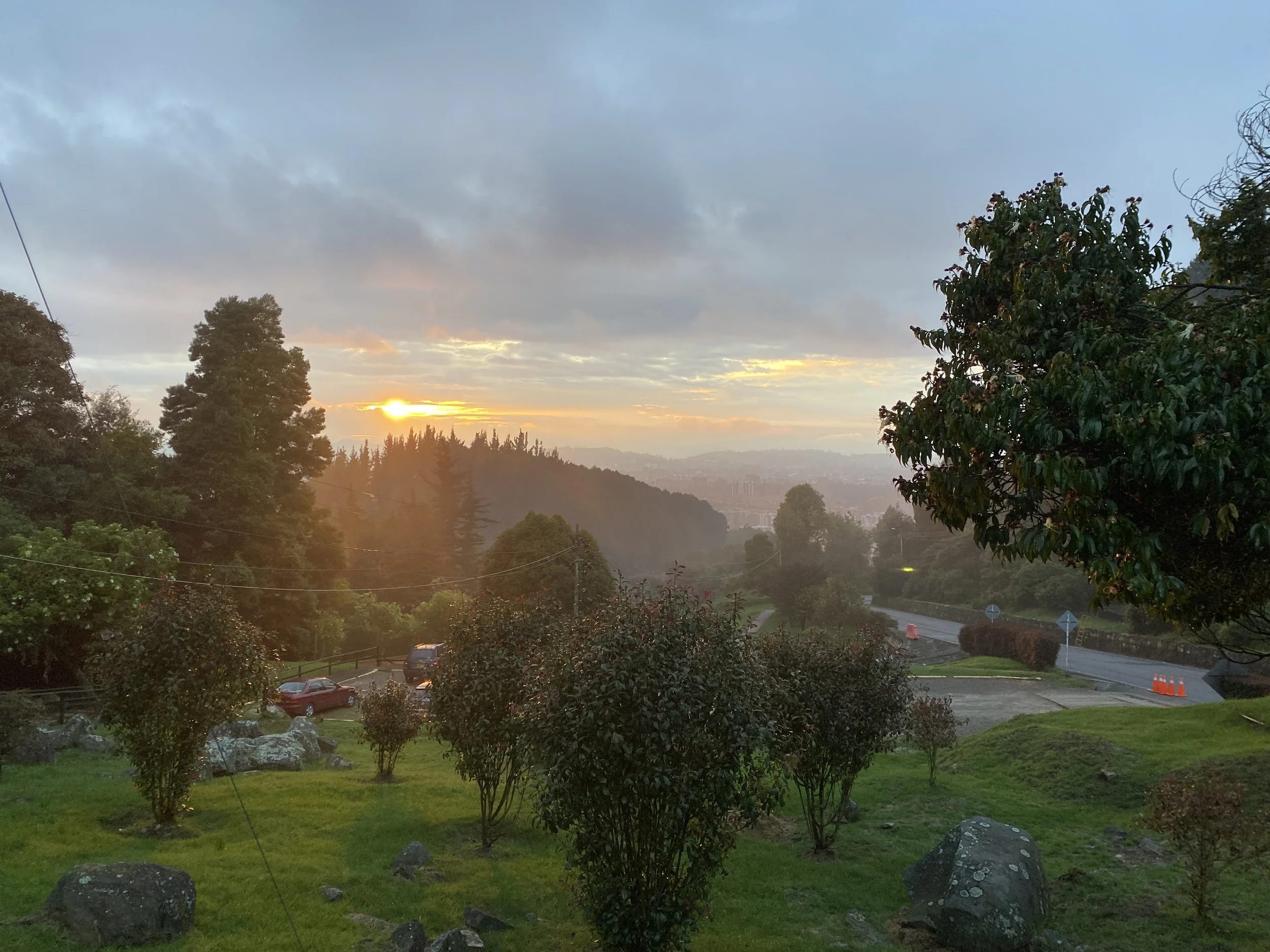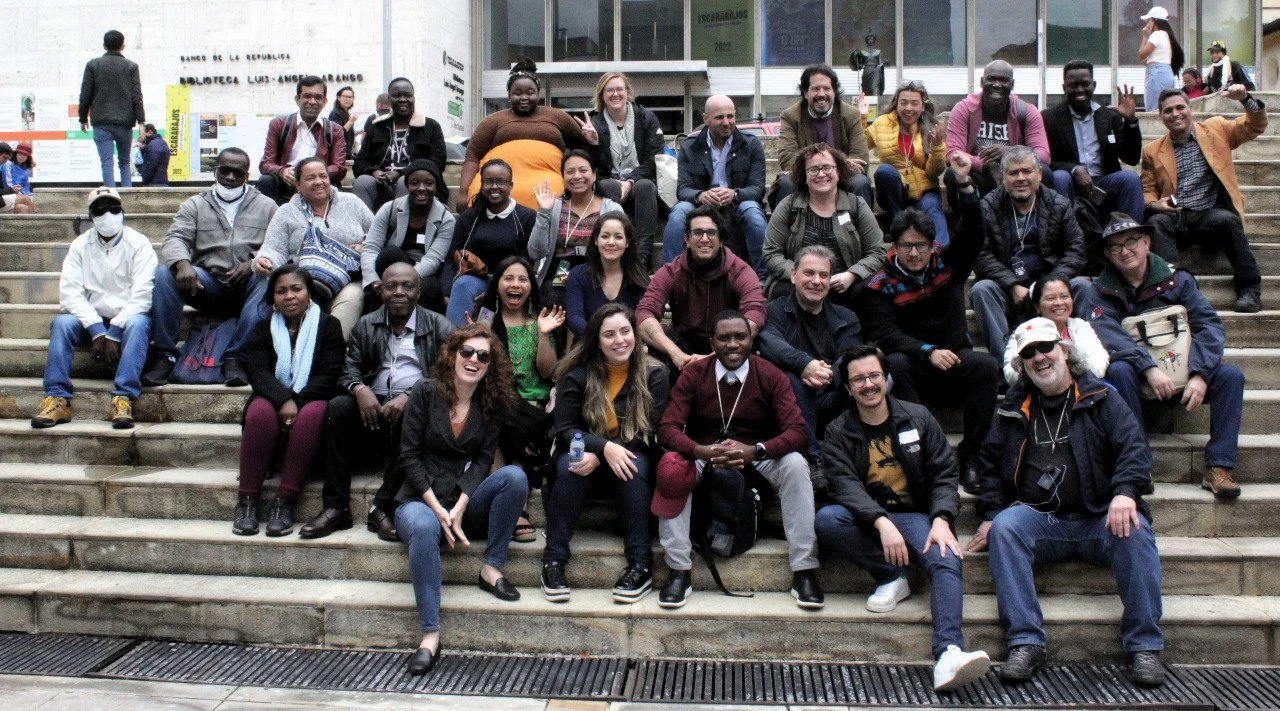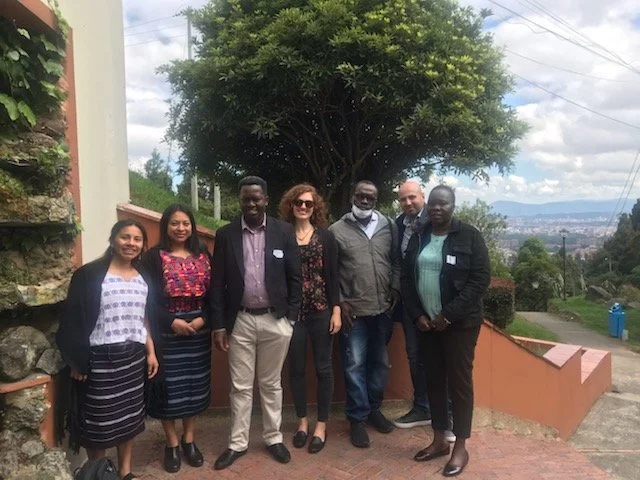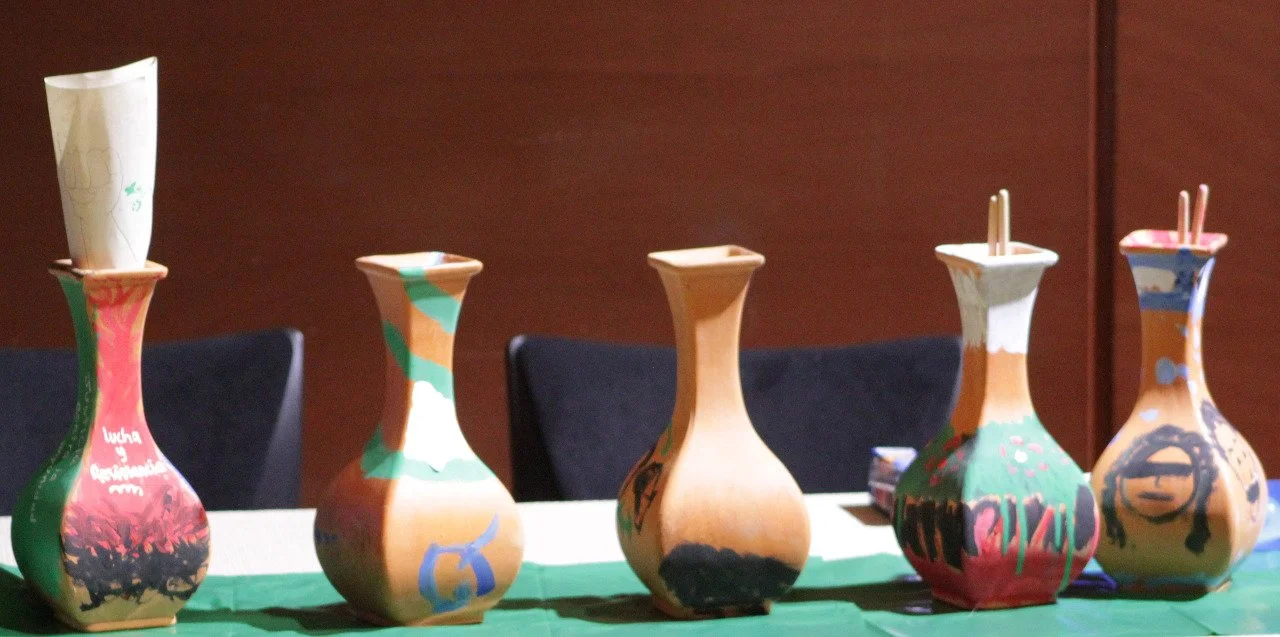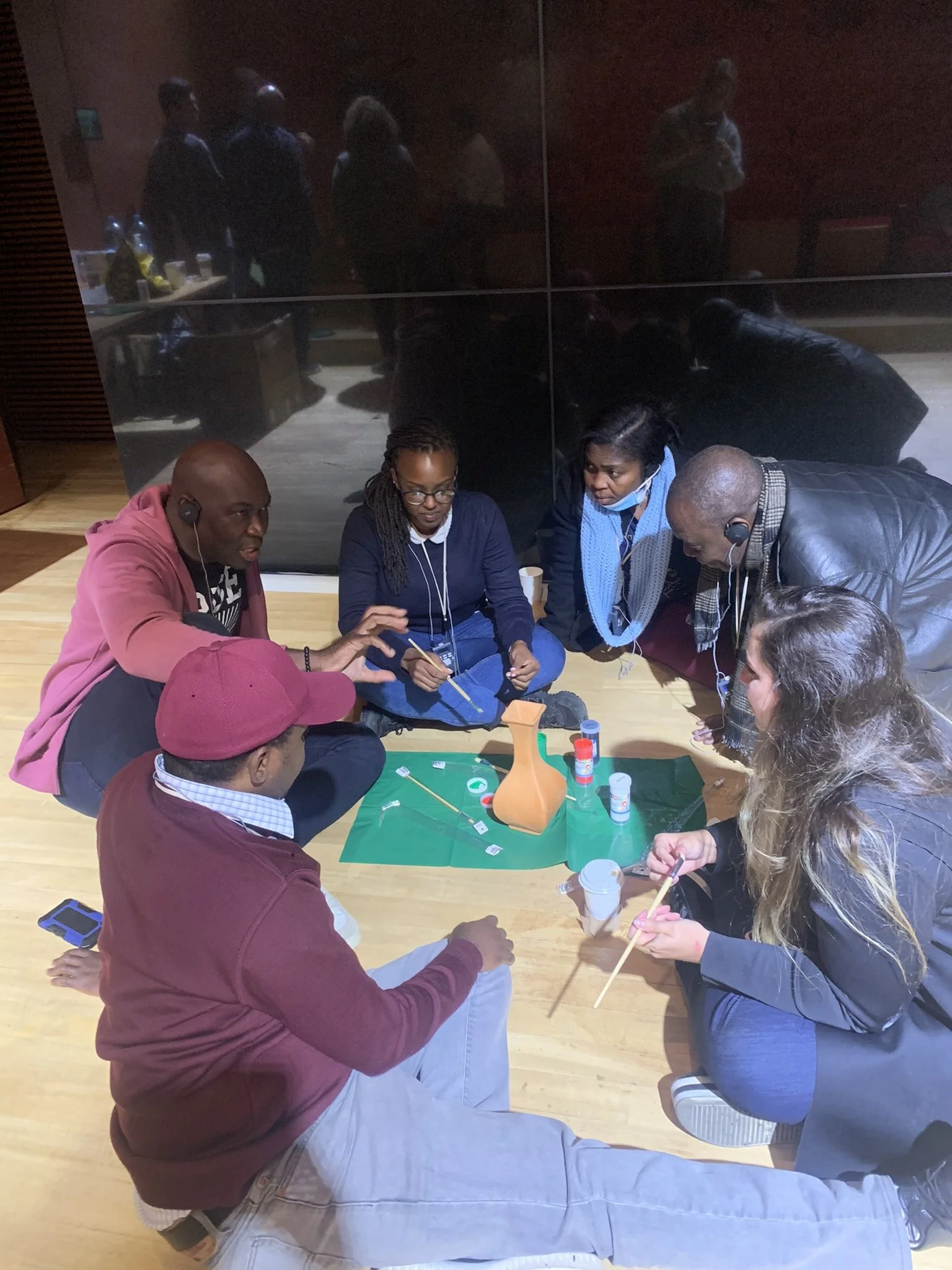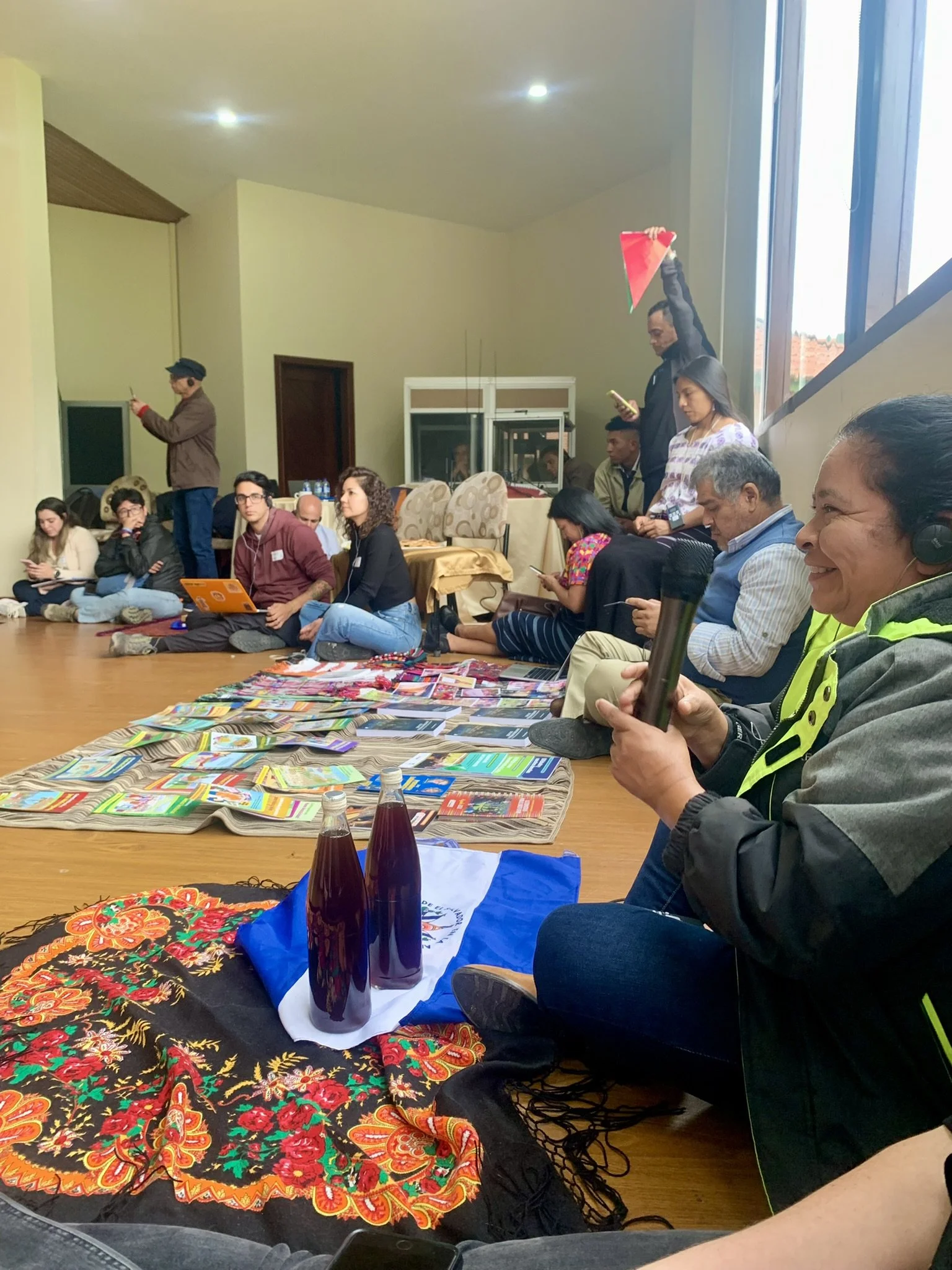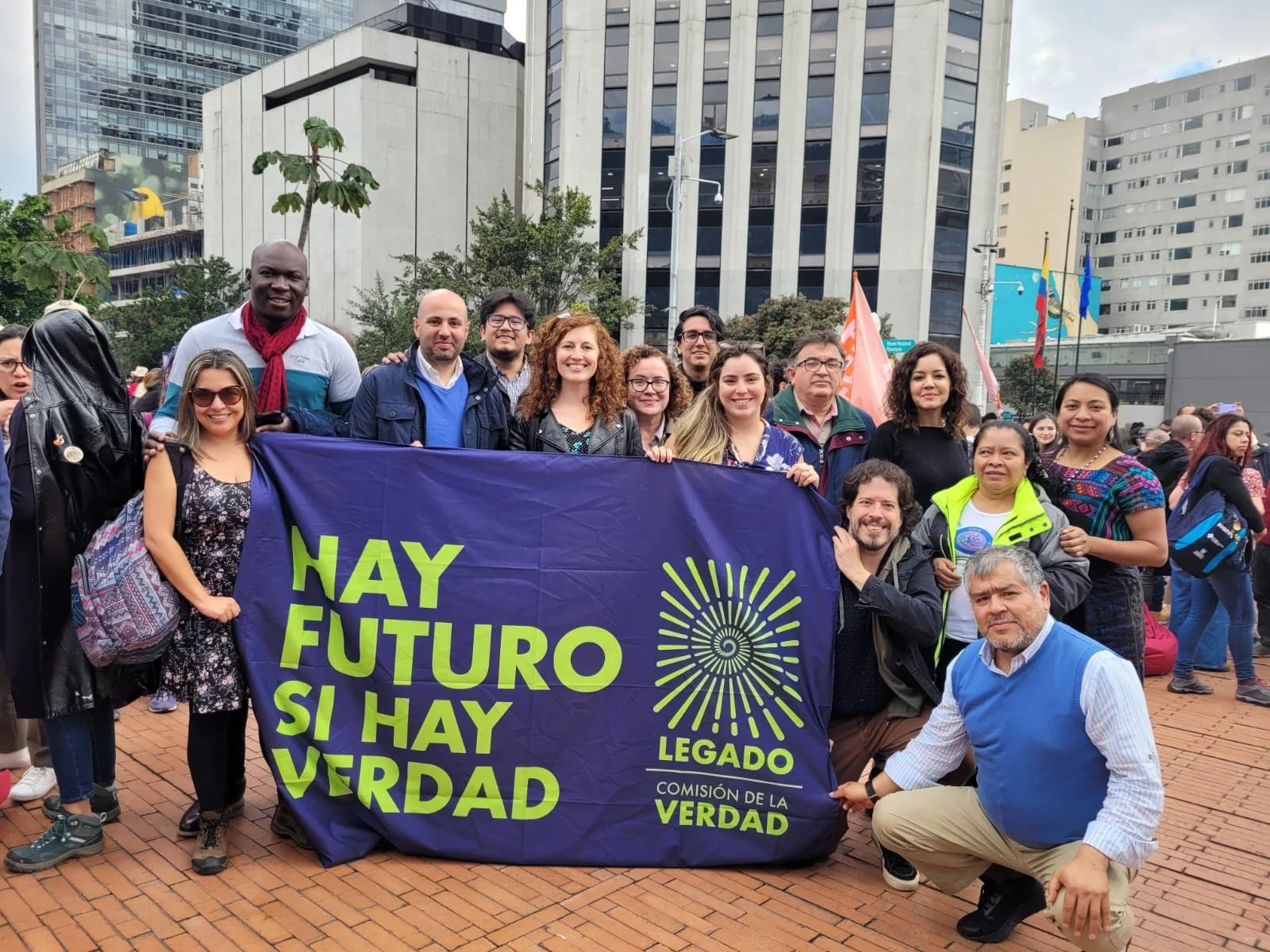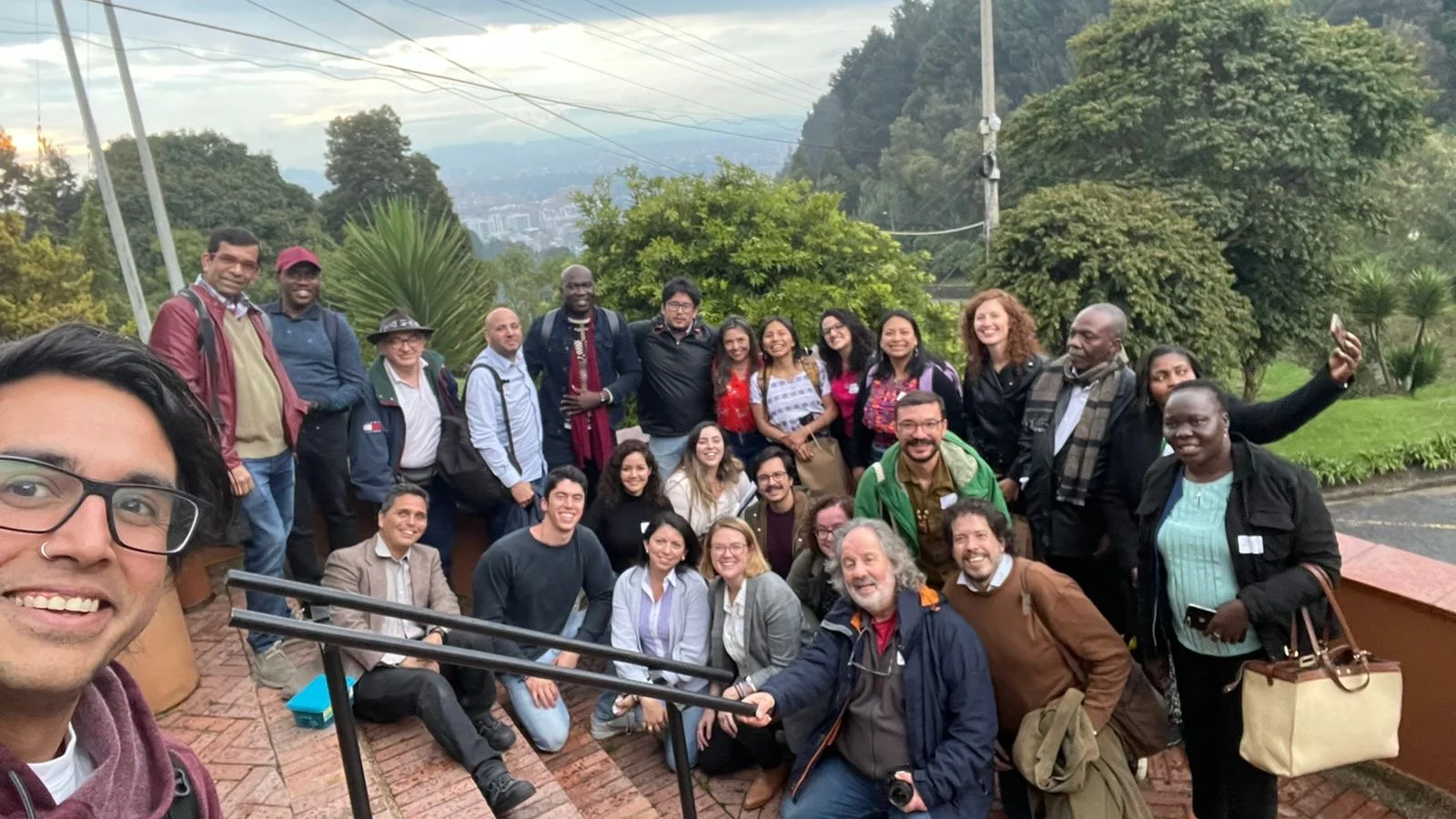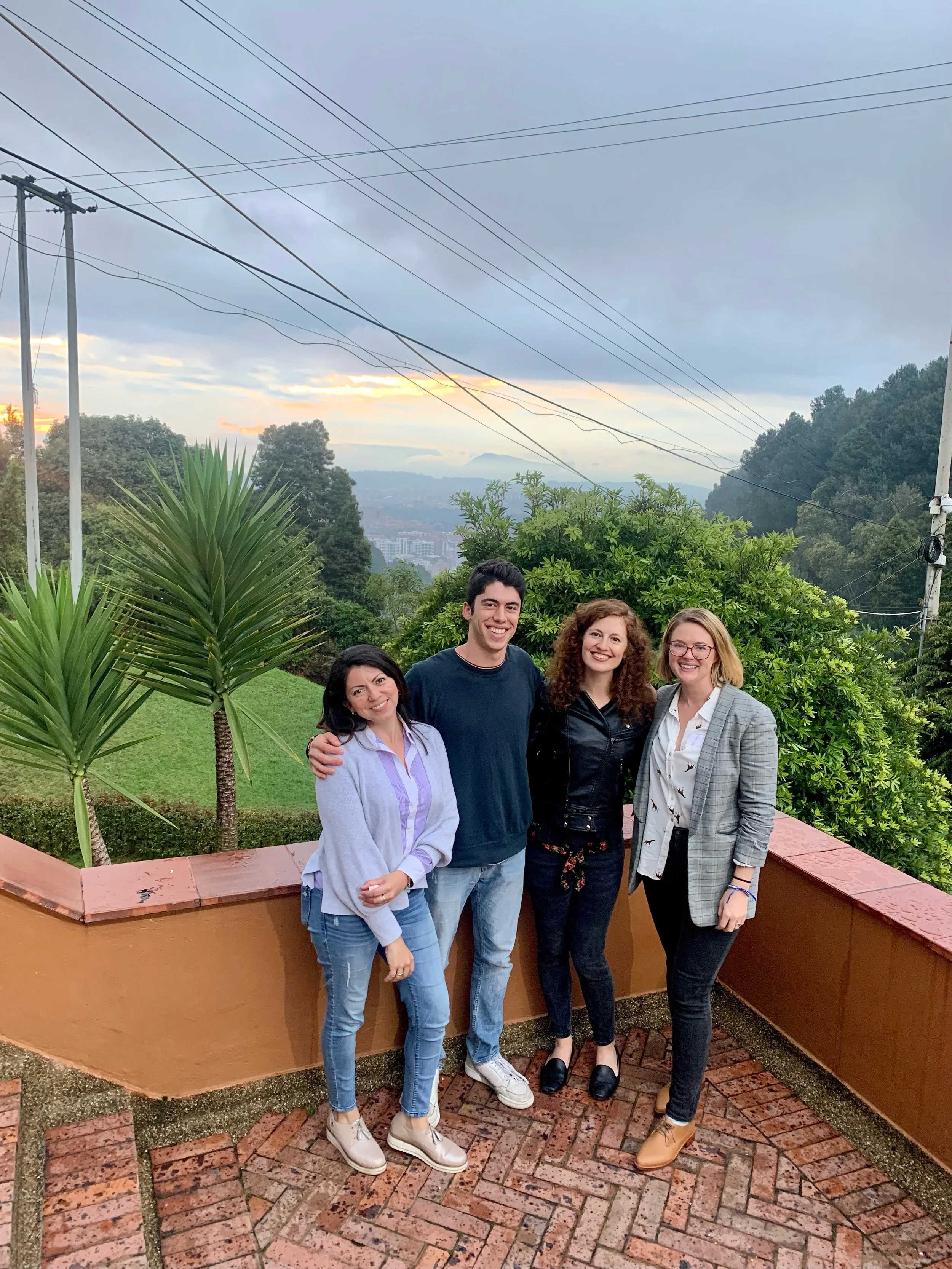From June 26th to June 28th, 2022, CAL and our partners at the African Coalition for Corporate Accountability, Dejusticia, and the Comisión Intereclesial de Justicia y Paz held an in-person gathering of the Corporate Liability and Sustainable Peace (CLASP) Lab, a collection of nearly 40 leaders and advocates from 25 countries, in Bogotá, Colombia. The convening was the culmination of a year-long virtual “social lab” process in which we led the group through an adaptation of our legal design process around the question of corporate impunity for human rights and environmental abuses committed during conflict–and how to break with that impunity.
The full group in La Candelaria, Bogotá’s historic downtown
The purpose of the Lab, which will continue to work together post-Lab as a coalition was to more deeply understand the global state of impunity (and bright spots for accountability) for corporate abuses during conflict through comparative analysis and to develop and pilot new strategies for holding companies accountable for their roles in abuses during conflict. These strategies include expanding post-conflict and transitional justice mechanisms and frameworks to account for the role of companies and building solidarity in addition to strategies that run parallel to these frameworks. Finally together after more than a year of virtual Lab convenings, we spent our three days in Colombia workshopping strategy “prototypes,” engaging in a restorative justice experience with impacted community members and a perpetrator in the Colombian armed conflict, sharing our country-specific expertise, and building international solidarity for corporate accountability. And with the help of a phenomenal interpretation and tech team, we did this in three languages, in real time – a true feat!
We were thrilled to have the chance to build stronger connections and refill our well of inspiration in person. Now, we want to share that with our broader community. This scrapbook includes highlights from each day of the convening and our most important takeaways from the process. We’re proud of the work we put into making this convening happen, and we’re even more excited about the results!
Day 1
We began by visiting an exhibit on Colombia’s armed conflict--something to help us understand the country we were visiting and set the tone for the rest of the convening. The Colombian armed conflict began in the 1960s and has involved state actors, right wing paramilitaries, left wing guerillas, as well as influence from the US government and multinational corporations. We’ve written about our push to include corporations in the Colombian peace process, so the exhibit was a good chance to fill the whole group in on that work as well as their Colombian colleagues’ work.
Photo credits: Eduardo Nachman
After a brief reflection on the exhibit in which we painted vases with our reaction to the exhibit, we moved on to one of the highlights of the convening: a restorative justice activity led by co-convening organization Comisión Intereclesial de Justicia y Paz.
We sat down with two community members directly impacted by Colombia’s conflict and a high-profile perpetrator the community members had invited to join us. This perpetrator, a former military colonel, has actively participated in Colombia’s transitional justice and restorative justice processes with impacted community members since the completion of his prison sentence. Hearing their stories was intense and thought-provoking, and participants had the chance to ask questions, grapple with whether the process could apply to their own jurisdictions, and gain an understanding of new models of grappling with the past. Their observations on truth were especially interesting - the two impacted community members pointed out that the full truth of the conflict will never be known, so it is important to focus on the integral aspects of the transitional justice process, including special courts and restorative justice initiatives. Through this dialogue, it was acknowledged that human rights violations committed by military members, in cooperation with paramilitary forces, served as a way to protect the wealthy and their economic interests. We spent the evening reflecting on atonement and accountability as we ate dinner in La Candelaria, Bogotá’s historic downtown, and walked through la Plaza de Bolívar together.
Day 2
The next morning, we continued our conversation with impacted community members from Colombia, including hearing from Lab member Jani Silva, a community leader directly impacted by corporate abuse.
We then shifted our focus back to the Lab’s substantive work products. Throughout 2021, the Lab divided into four teams, each grappling with a different aspect of the Lab’s overarching question on advancing corporate accountability in transitional and post-conflict settings. These teams developed multiple potential strategies for advancing accountability and broke into smaller groups to “prototype” the ideas and assess how they might play out in the real world. We held a prototyping workshop in which each of these groups delved deeper into the issues their prototypes aim to address, came up with work plans for strategy roll out, and received real time feedback from a panel of invitees.
We ended the second day with a feria, or fair. Each participant brought a few items from their home country and organization to share their work and culture with the group. We each presented photos, printed materials, and artifacts to give each other insights into our background outside of the Lab. We built community and connections that will help us continue to work together in the future to address the global problem of corporate impunity for abuses in conflict settings. We even traded the items we brought from home with each other!
Day 3
The final day of the CLASP Lab convening was a fortuitous one. Our group of social justice lawyers and impacted community members from around the world was present in Bogotá as Colombia’s Truth Commission (CEV), an institution part of the world’s most advanced transitional justice system, released its long awaited report. A CLASP Lab delegation attended an in-person demonstration celebrating the launch of the report. The rest of the group met with Daniel Marin, a former CEV expert consultant, to hear about the drafting process of the report, and how the CEV grappled with the issue of economic actor accountability. Hay futuro si hay verdad: there is a future if there is truth! We also heard from Ana Maria Mondragon, Deputy Judge at the Special Jurisdiction for Peace (JEP), on the issue of victim participation, and witnessed an exchange between her and impacted community members.
In the second part of the day, we held a cross-jurisdictional strategy exchange between Lab participants from Africa and Latin America. Five participants from the African region presented on transitional justice mechanisms and strategies in various country-specific contexts and then held space for responses and questions from folks from Latin America. Hearing such a granular view of what worked and didn’t work in each scenario opened up a discussion about how the work of the Lab intersects with decolonization, tradition, and organic, local solutions to the problems. We learned more in these few hours than we had in years of studying this field- check out our Twitter thread for notes!
What’s Next
We gathered this amazing group for a one year experimental “social lab,” but the CLASP Coalition, directed by an elected Leadership Team, will continue to support strategic partnerships, prototype development, and future events for the group. Our own Staff Attorney, Tatiana Devia, is a member of this leadership team and will facilitate CAL’s involvement in the group going forward. For our final activity, we opened up a discussion on what we’d learned in the past year and the future of the CLASP Coalition. Together, we reflected on the usefulness of the Coalition as a tool for collaboration between activists, legal practitioners, and human rights defenders, as a space to promote restorative justice and community involvement, and as a means to bring a high-priority prototype to fruition. We all valued the knowledge-sharing facilitated by the Lab and want to continue to benefit from its collaborative space - hopefully with an annual in-person convening. We’re excited to see what comes next, and will certainly keep the CAL community updated!
The CAL convening team, Tatiana, Avery, Charity, and Daniel, would like to express our gratitude. This convening was a massive undertaking, and it could not have been successful without all of the hard work of our partners and colleagues--not to mention the support of our community back home. Thank you to the CLASP Lab co-convening organizations, our incredible interpretation and tech team, and all Lab participants who made the journey, however long or short, to Bogotá to be with us. It was an unforgettable experience, and we hope to see everyone again at the next convening of this group of lawyers and impacted community members advancing corporate accountability in transitional and post-conflict settings around the world.
We’re grateful to have gotten to know so many amazing community leaders, activists, lawyers, and advocates through the CLASP Lab. The Lab group includes: Aaron Weah, Abu Augustuis Brima, Alaa Talbi, Andressa Soares, Bonyan Gamal, Carlos Andres Santiago, Cynthia Arco, Danilo Urrea, Eduardo Nachman, Elvis Mbembe Binda, Emmanuel Umpula, Eric Kajemba, Fabian Leon, Gabriel Pereira, Hamouda Soubhi, Hermelinda Chicop Choxin, Jackline Nasiwa, Jani Silva, Javier Malpartida, Juan Carlos Ruiz, Karinna Fernandez, Krystel Bassil, Laura Buitrago, Laura Duarte, Laura Posada Correa, Luis Andres Franco, Marina Parada, Milvian Aspuac, Mouhanad Sharabati, Natalia Bonilla, Nathalie Lyse Menyimana, Pablo Gargiulo, Padre Alfredo Souza Dorea, Sandile Ndelu, and Tara Van Ho. We are also thankful for our co-convening team, including Sâ Benjamin Traore, Michael Monclou, Natalia Torres, German Rodriguez, Santiago Mera, and our observers, Elizabeth Deligio and Kaushik Sunder Rajan.
In memory of Blanca Velasquez.

